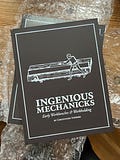We all have our personal brand of stupidity. My stupidity looks like this: slicing a steak with the knife upside down in my hand (the cutting edge facing the ceiling). It works, but it takes a stupid amount of effort.
And I eat the entire steak that way, oblivious.
Keep reading with a 7-day free trial
Subscribe to The American Peasant to keep reading this post and get 7 days of free access to the full post archives.



